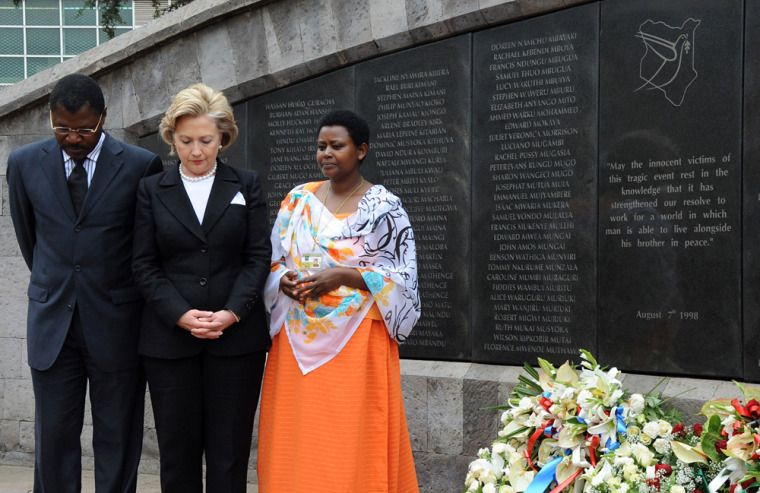U.S. Secretary of State Hillary Rodham Clinton on Thursday pledged to "expand and extend" American support for Somalia's weak interim government as it struggles against Islamist extremists believed linked to al-Qaida.
Accusing the extremist Somali militia known as al-Shabab of trying to turn Somalia into a base to launch worldwide terrorist attacks, Clinton said the Obama administration would boost military supplies and other aid to the government and an African peacekeeping force supporting it. She did not detail the new aid.
Clinton also warned the Red Sea country of Eritrea, accused by the U.S. of supporting al-Shabab, that it would face penalties if it continues to supply the group with arms and funding. "It is long past time for Eritrea to cease and desist its support for al-Shabab," she said.
Clinton said that al-Shabab sees "Somalia as a future haven for global terrorism," and noted the recent arrests of four men allegedly linked to the group who are suspected of plotting attacks in Australia.
Clinton said that the U.S. is concerned that "al-Shabab not only uses foreign fighters and foreign money but foreign ideas in its attack on the people of Somalia."
"There is also no doubt that al-Shabab wants to take control of Somalia and use it as a base from which to influence and even infiltrate surrounding countries and launch attacks against countries far and near," Clinton said after meeting beleaguered Somali President Sheik Sharif Sheik Ahmed at the U.S. Embassy in Kenya.
Ahmed agreed.
"Their aim is to make Somalia a ground to destabilize the whole world," said Ahmed, who appealed to Clinton for additional resources. "We cannot suffer any longer. The people of Somalia have a right to peace."
U.S. to double its aid to Somalia
Although Clinton did not discuss the new assistance, other U.S. officials have said the administration plans to double an initial provision of 40 tons of arms sent to Somalia through other African nations.
The U.S. also has begun a low-profile mission to help train Somali security forces in nearby Djibouti, said the officials, who spoke on condition of anonymity because of the sensitivities surrounding U.S. involvement in the program.
Ahmed's government, which holds only a few blocks in Mogadishu with support from the peacekeepers from Uganda and Burundi, said Clinton had promised to "redouble" assistance.
Ahmed said Clinton had made promises of assistance on the "security front" and on the "humanitarian front." He would not elaborate.
Clinton said only that she and President Barack Obama "want to expand and extend our support." She also noted that the U.S. had given nearly $150 million to support the peacekeeping operation in Somalia over the past two years and said more money would be coming.
Avoiding repeating history
U.S. involvement in Somalia is a sensitive subject because of the 1992-94 American military intervention that began as a humanitarian mission to deliver aid supplies to Somalia.
That ended in a humiliating withdrawal months after the 1993 "Black Hawk Down" incident in which two U.S. helicopters were downed and 18 servicemen killed.
A spokesman for al-Shabab said Wednesday that any U.S. assistance to Ahmed's government or the peacekeepers would not stop its forces from fighting and predicted a repeat of the 1993 experience.
"Any support America gives the government will not deter us from pursuing our path because we believe Allah and we always hope from him to give us the upper hand," Sheik Ali Mohamud Rage told reporters in Mogadishu.
Somalia has not had an effective government since 1991 and the top U.N. envoy for the country has said the country is now at a "turning point" and in desperate need of international support, especially military equipment, training and money.
'Sick and tired' of the violence
The United Nations Special Representative for Somalia, Ahmedou Ould-Abdallah, welcomed Clinton's meeting with Ahmed, saying, "The Somali people are sick and tired of violence which has destroyed their lives."
"The international community must not let them down now," he said Thursday in a statement.
In addition to its current attacks against the Somali government, the U.S. accuses the al-Shabab of harboring suspects in the 1998 bombing of the American embassies in Kenya and Tanzania.
Earlier Thursday, Clinton honored the victims of the 1998 embassy attacks in Nairobi and Dar es Salaam.
A day before the 11th anniversary of the Aug. 7 bombings, she placed a wreath at the site of the former Nairobi embassy where 218 people died.
Clinton said it was a day "to renew our resolve to do all that we can to ensure that these attacks don't take more innocent lives in the future."
